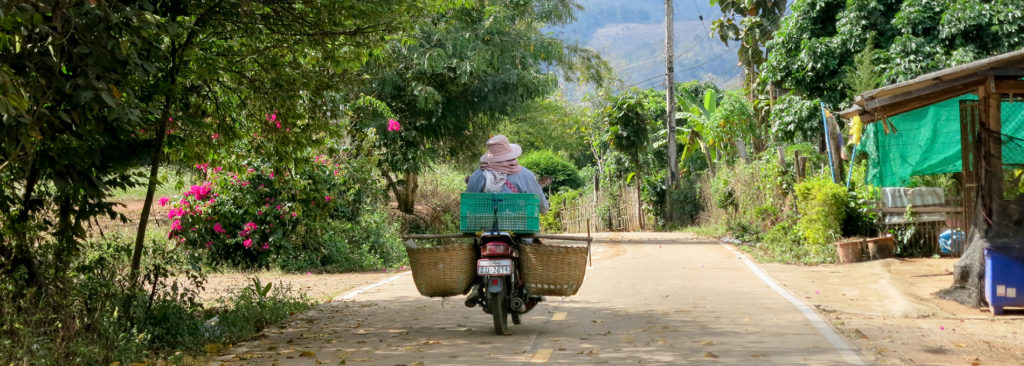Finding a sense of place in a life of transience
Harper McKay | September 24, 2018

On day one of being missionaries in Southeast Asia, my husband began petitioning for us to buy a motorbike. In our city of two million, almost everyone navigates the streets on two wheels, zipping in and out of traffic. My husband regularly presented me with all the ways our lives would be enriched by a bike.
At first, I did not agree. While I like bikes, I was hesitant to invest in something only to leave in a few months when our language program ended.
The life of a missionary sometimes involves planting yourself in one place for a long time. However, many times the missionary life can be a life of transience, at least for some seasons.
My husband and I have been in such a season for several years. We haven’t spent more than two years in one place since we served as singles in Southeast Asia, got married and studied at Southeastern for a wonderful but short time.
A little over two years later, we find ourselves on our first stop in Southeast Asia, nearing the end of our language program. We will soon move to another country to spend a few years learning language and culture and seeking where to serve longer term.
From time to time, God may ask some of us to uproot ourselves and serve him in various locations. In a life with so much transition, how can a theology of place inform the way we serve the Lord?
Searching for answers to this question has given me a sense of belonging that I didn’t think was possible in this season of our lives.
A Purpose For Every Place
God always has a purpose for us in the places where he sends us, even if it’s only for a short time. The people we meet and the spaces we occupy are just as important to our ministries as any strategy.
Take Priscilla and Aquilla for example. In a relatively short time they went to Rome, Corinth, Cenchreae, and Ephesus, making the most of their time in the places God had sent them. In Corinth, they lived and worked with Paul as tentmakers, contributing to the economy of their new place. Later in Ephesus, they were positioned to take Apollos under their wings and explain to him “the way of God more accurately” (Acts 18:26).
When God uprooted Priscilla and Aquilla, they didn’t avoid engaging with the places they were sent because it was temporary. Instead, they became part of the place and invested deeply in its people even if for a short time.
The more we experience transition, the more I see the importance of having a solid theology of place. The past eight months in our language program have been transformational in the way I view my role in the place where I am.
From the beginning, my husband and I prayed for the Lord to give us the vulnerability to put down roots even though we’d have to pull them up soon. We have seen God work mightily in our neighborhood and our local church.
Early on, we studied the ways of our neighborhood and learned to do things as our neighbors do. We have celebrated with them, grieved with them, visited them in the hospital, exercised with them and frequented their usual places. Our house has been used to entertain kids and celebrate Christmas with our Muslim neighbors.
We also became part of a church in the local language. Not only has this skyrocketed our language progress, but it has given us insight into what life is like for followers of Christ in this Muslim-majority nation. We have worshiped alongside them, prayed with them, served with them and learned from them. Jumping in with both feet has given us a oneness with these believers that usually takes a long time to cultivate.
It has been hard work, and I admit that many times I wanted to just hide inside my house. But we have seen God work in great ways. Several neighbors have heard the gospel, a group of persecuted believers are taking steps to meet together again, a Muslim lady is reading the Bible for the first time and our local fellowship is exploring ways to partner with us in the next country we will serve.
We never thought things like this could happen in such a short time, but God had a purpose for us in this place at this time. All we had to do was follow him.
A Word of Caution
In no way am I saying that a life of transience is better than a life planted in one place. However, in some seasons of life, God may call us to some places for a short time. In these seasons, it is possible to make an impact in the place God has you for however long you are there.
A transient lifestyle is not easy. It is painful to say so many goodbyes and start over again. It hurts to make deep relationships only to leave them behind.
Just because it hurts to be uprooted regularly doesn’t mean you shouldn’t put down roots wherever God places you. A transient lifestyle is not a detached lifestyle. It requires vulnerability and the willingness to bear the pain of being part of a place and leaving when God calls you to go.
Eventually, I gave in, and we bought the motorbike. As soon as we did, another layer of this place opened as neighbors invited us to places more easily accessed by bike. We adapted to this place and its people, and they have become our place, our friends.
As we follow God to our next place, we hope that we are leaving behind more than a used bike. We hope that the light of Christ that shined through us will continue to draw people to him long after we leave.
Harper McKay is a missionary and writer working in Southeast Asia with the IMB.
*This article was originally published in Southeastern’s Spring 2018 magazine.

From our local community to the outermost parts of the world, Southeastern students and alumni are reaching people with the gospel by fulfilling the Great Commission. Using the model of Acts 1:8, we want to highlight these stories of how our Southeastern family is serving in North Carolina, North America and around the world. Acts 1:8 Stories create a collective and consistent way to tell the story of Southeastern, one person at a time. From local pastors to missionaries among the unreached, God is doing a great work among students and alumni. Where are they now and where are they going? We can’t wait for you to find out!